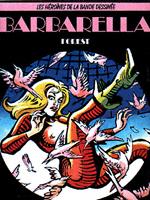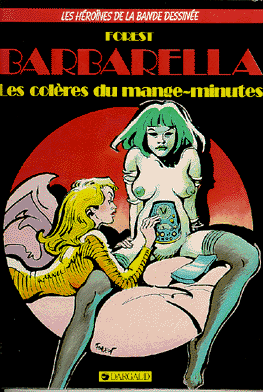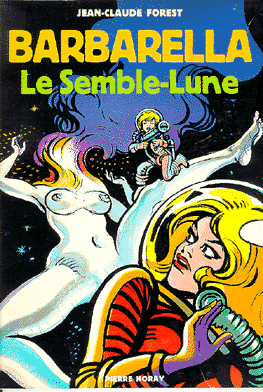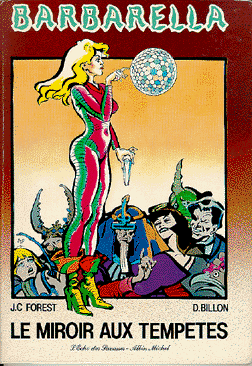|

MORE ON
BARBARELLA
GALLERY
OF
IMAGES
|
History:
Jean-Claude Forest created the character of Barbarella
for V-Magazine in 1962, at the request
of its editor, Georges H. Gallet, who was already familiar with Forest's work as France's premier science fiction cover artist and had commissioned an illustrated
version of Catherine L. Moore's classic story Shambleau in 1955.
Barbarella was published in book for by
Eric Losfeld's publishing company Le Terrain Vague in 1964, became an immediate runaway bestseller and was soon
translated in a dozen countries, including by Grove Press in the United States. Not long after, it was adapted
into a 1968 motion picture,
produced by Dino de Laurentiis, directed by Roger Vadim, and starring Jane Fonda, for which Forest acted as design
consultant.
An animated Barbarella
was contemplated by Canadian producer Nelvana during the 1990s, but never took off.
In 1999, Warner Bros. and 20th Century Fox reached an agreement to co-produce a new Barbarella feature film. John August (Go,
Charlie's Angels) was hired to write a
screenplay. Laura Ziskin (Spider-Man),
Drew Barrymore (Charlie's Angels) and
Nancy Juvonen (Charlie's Angels) are named
as producers on the movie, with Barrymore likely to star. However, nothing came of it.
In 2006, Producers Dino and Martha De Laurentiis reacquired the rights and have hired writers Neal Purvis and Robert
Wade (Casino Royale) to script a new feature
film.
news release No. 1 - txt
news release No. 1 - pdf
 Books: Books:
In the first book, space agent Barbarella
has various adventures on the planet Lythion, trying to rescue the scientist Durand Durand from the clutches of
the evil Black Queen. In the second volume, Barbarella, now the owner of a space circus, explores a slow-time
planet. In the third and fourth volumes, she eventually marries and has a child. Portions of the first
graphic novel were adapted into a feature film by Roger Vadim.
1: Barbarella (story & art), serialized
in V-Magazine (1962); collected by Le
Terrain Vague (1964); translated into English by Grove Press (1964)
2: Les Colères du mange-minutes
(story & art), Kesselring (1974); untranslated.
Note: Partially drawn and serialized in 1968-69 but completed only in 1974.
3: Le Semble-lune (story & art), Pierre
Horay (1977); translated into English as Barbarella and The Moon Child by Heavy Metal (Feb-July
1978 issues).
4: Le Miroir aux tempêtes (story)
(drawn in collaboration with Daniel Billon), L'Echo des Savanes (1981); Éditions du Fromage (1982); untranslated.
There is also a spin-off story, Mystérieuse,
Matin, Midi et Soir, in which a much older Barbarella rescues Professor Alizarine and his friends who are stranded on a Mysterious Planet.
 

|